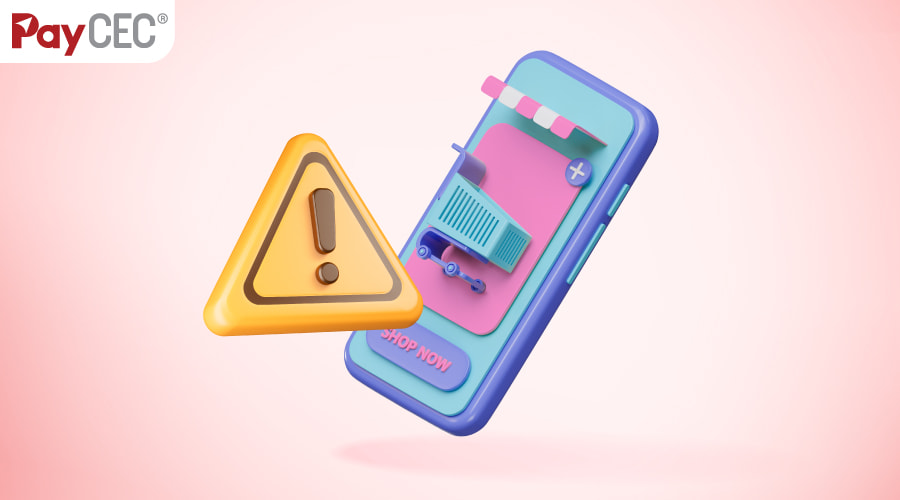- Hotline +65 6631 8332
How Afterpay Affects Your Shopify Business' Sales and Conversion Rates
Friday, 20 Sep, 2024

This article is a part of PayCEC payment insights
Follow PayCEC - global payment gateway to get updates on the latest payment trends and ecommerce news
What's inside?
How Afterpay Affects Your Shopify Business' Sales and Conversion Rates
With its highlighted features like flexible payment options, Buy Now Pay Later service, and checkout process simplification, Afterpay has brought its worldwide users so much ease of use that may lead them to overspend, making business partners wish to have this app for boosting sales, increasing average order value, and improving conversion rates.
Enhancing Customer Experience: Using Afterpay on Shopify

Integrating Afterpay into Shopify stores offers an exclusive shopping experience to merchants.
Using Afterpay as the default payment gateway for your store on Shopify is ideal to enhance the customer experience with its flexible and interest-free payment option. Since there are more and more innovative payment methods to meet users’ needs and demands, businesses that allow customers to pay with their favorite payment methods will gain their trust and minds.
Indeed, Afterpay’s Buy Now, Pay Later (BNPL) service encourages loyalty through positive shopping experiences, and its seamless integration with Shopify ensures a smooth checkout process, enhancing overall customer satisfaction, and possibly impacting business stores' sales and conversion rates.
How Afterpay Affects Your Shopify Store's Sales and Conversion Rates
Afterpay aims to reduce the finance-related stress of users by making high-priced items more accessible and manageable over time. As a result, the BNPL service of the company has done more than expected as it ranks as the second most trusted third-party Shopify payment gateway, according to Statista 2024 research.
By making high-cost purchases more affordable to most consumers, Afterpay has increased their confidence to shop for things they wish without feeling stressed about the price. And because of that, Afterpay positively impacts online businesses' sales and conversion rates on Shopify by offering multiple payment options. It increases average order values, reduces cart abandonment, attracts new customers, and encourages repeat purchases, leading to higher overall sales and customer loyalty.
Mentioning customer loyalty, a survey by Ipsos, and Alphabeta analysis has shown that the most-agreed reason why people like Afterpay so much is because it helps them manage their finances effectively, which accounts for 57% of the survey respondents. When asked for more specific reasons, people responded that Afterpay’s spending limits have kept them from overspending. In addition, the app has no hidden or additional fees, and it is easy to use.

Afterpay is not only a useful payment tool for merchants but also an effective finance management of their customers.
Following is the second reason for the affordability of the app with 22%. The third and fourth reasons are it allows users to buy things they normally cannot afford (13%), and it soothes their feelings to buy expensive things (7%), respectively.
The researched data above presents the customer insight into what they want in a payment system, at the same time, it reflects the popularity of the Afterpay app in bringing in their advantages to satisfy their customers. This stands as the reason why online businesses should consider Afterpay for their stores, together with the cost structure.
Understanding Afterpay Cost Structure for Shopify Merchants
Choosing the right payment system for your online business takes much time and effort to research, study, understand, and compare various aspects, including the cost issues. Therefore, understanding the financial implications of using Afterpay is crucial for Shopify merchants. Let's break down the costs involved in the below section.
Typical Afterpay Fee Structure
Typically, Afterpay charges merchants a flat rate for each order of approximately 4-6%, the other chargeback fees due to delayed payments or disputes, marketing costs, customer support costs, and Shopify transaction fees depending on your Shopify plan. These fees can vary based on factors like the merchant's sales volume (merchants with the larger sales volume, the lower rates), geographical location, and specific Afterpay plans.
Comparing the Cost - Benefit Balance
While Afterpay can boost sales and average order value, it's essential to evaluate whether the increased revenue outweighs the additional costs or not so you can step back and go for another more suitable option.
While choosing the right payment option, you can consider these:
- Sales and average order value: See if your average order value or your sales are positively impacted when you use Afterpay.
- Customer acquisition cost: Evaluate if the new customers acquiring through Afterpay are cost-effective.
- Customer retention: Assess how Afterpay influences customer loyalty and repeat purchases.
- Chargeback rates: Monitor your chargeback ratio to understand the potential financial implications of using Afterpay.
Afterpay, like any other reliable payment system, only leverages the business advantages with the right usage and for the right purposes. It would be a powerful companion when the benefits it brings outweigh the costs and resources it takes. Afterpay introduced in this article is such an ideal companion to all online businesses, however, you may want to consider and do some calculations before making the decision.
Indeed, there is one more factor that you should take notes on and prepare when going for Afterpay, and that is the integration issue.

Afterpay offers a great idea for store owners to increase their sales on the platform and expand their customer base to a worldwide scale.
Troubleshoot Common Issues with Afterpay Integration And Launch on Shopify
Integrating Afterpay with Shopify can sometimes present challenges. Let's address some common issues and their solutions.
1. Afterpay Not Available at Checkout
For some reason, the most common issue with using Afterpay is when people cannot find this payment option anywhere at the checkout.
If this happens, you first need to ensure your Afterpay account works fine. Make sure the Afterpay integration into your Shopify store is all right. You would also want to try accessing the payment page from different browsers or digital devices.
And when the above ways are useless, you must contact the Shopify customer service immediately.
2. Afterpay Payment Errors
Most of the time, the Afterpay payments cannot be successfully made due to the wrong amount of value limits, wrong location, card issuer, or creditworthiness. If the issue persists, reach out to Afterpay's customer support for assistance.
3. Afterpay Orders Are Not Syncing Correctly
When this is the case, you must first make sure your orders are marked as “Paid” or “Authorized” in Shopify. Then check if your order information is correct, including customer details, shipping address, payment amount, card number, etc. The final step when things don’t get any better is to contact Afterpay or Shopify customer support.
Though being equipped with high-security features in the market, Afterpay, like any other payment system, can also go wrong sometimes with errors and technical problems. Instead of relying on those security protocols to track and respond, you can actively prevent, or at least, minimize the damages caused by those unwanted issues by staying updated with the newest version of the app, and regularly doing the trial test to make sure the integration is functioning correctly.
_
Since Afterpay is only available in some countries like Australia, New Zealand, the United Kingdom, the United States, and Canada, people in other countries and regions cannot benefit from the app. If your businesses are in those regions, there is another ideal option that covers more than 99 countries and borders all over the world with its innovative payment gateway system, which is PayCEC.
While Afterpay focuses on providing the specific BNPL payment option to customers, PayCEC offers a wider range of payment processing services including BNPL. With its well-known multiple payment methods acceptance feature, and fast 24-hour integration that enables business partners to immediately assist their customers in sending and receiving online payments within a day, PayCEC has higher conversion rates compared to many other competitors in the market.
In the end, while Afterpay would be a great choice for businesses who want to have a flexible payment option to increase sales and average order value, PayCEC will be the right system for merchants who prefer a more comprehensive payment.
About PayCEC
PayCEC was established in response to the growing need for businesses to accept online payments more quickly and easily. In the new media era, our payment flow has evolved to work seamlessly and effectively across all platforms and devices. We pride ourselves on combining superior technology with first-class customer service.
PayCEC is a truly global payment platform that not only allows customers to get paid but also withdraw funds to their business accounts in various currencies.
We have created an open and secure payments ecosystem that people and businesses choose to securely transact with each other online and on mobile devices.
PayCEC Team
Frequently Asked Questions
Does Shopify work with Afterpay?
Yes, Shopify does work with Afterpay. Indeed, Afterpay is one of the most chosen payment processing options on the platform. Merchants using Shopify can integrate Afterpay as a third-party payment option in their online stores with seamless integration and launching.
Afterpay is well-known for its "Buy Now, Pay Later" service that allows customers to spread their payment for a purchase out to smaller interest-free installments. Offering Afterpay as a payment system on the Shopify platform enables shoppers to afford things they cannot usually purchase, increasing sales and decreasing cart abandonment rates.
Indeed, Afterpay can benefit online businesses more than they can expect, as long as their groups of customers are those who prefer the BNPL methods, and Afterpay's main features match their long-term targets.
The Afterpay integration into the Shopify store is simple, you only need to follow these steps:
- 1. Download Afterpay in the Shopify App Store and install it on your online store.
- 2. Adjust the Afterpay settings to align with your store's needs and strategies.
- 3. Update the software to ensure Afterpay is enabled as a payment option in your Shopify payment settings.
- 4. Customize how Afterpay appears on your product pages and checkout page, and consider promoting it to inform your customers about the new payment option.
For detailed instructions, it's ideal to carefully review the terms and policies document of both Shopify and Afterpay or contact their support teams for assistance.
How do I add Afterpay to Shopify 2023?
Since Afterpay is still one of the most chosen payment processing options on Shopify in 2023, plus there is no chance in the integration process of the software on the platform, the installation of Afterpay into Shopify remains unchanged as follows:
Step 1: Sign up for a merchant account on Afterpay's official website.
Step 2: Install the Afterpay app by going to the Shopify App Store and searching for "Afterpay". Hover to the Afterpay icon and click on the "Add app" button. Other steps to finish the installation are to follow the prompts.
Step 3: Adjust Afterpay Settings to fit with your business visions and strategies.
- 1. Open Afterpay from your Shopify admin and follow the instructions to connect your Afterpay merchant account to the app.
- 2. Customize and adjust settings according to your business preferences, such as minimum and maximum purchase amounts for Afterpay.
Step 4: Promote Afterpay: Inform your customers about the new payment option through your marketing channels, such as email newsletters, social media, and website banners.
By following these steps, you can successfully add Afterpay as a payment option to your Shopify store, offering your customers a flexible "buy now, pay later" payment method.
Why isn't Afterpay showing up on Shopify?
If Afterpay isn't showing up on your Shopify store, there are several potential reasons and corresponding solutions to check:
- 1. Your Afterpay merchant account may not be fully set up or approved, so you need to check to see whether you have completed the sign-up process with Afterpay or not. And Whether there is any pending step or approval or not.
- 2. There can be a problem installing or integrating Afterpay into your store so you will need to reinstall the Afterpay app from the Shopify App Store. Make sure you follow the steps carefully and ensure all steps are completed.
- 3. Afterpay is not set as your payment method so you may not see it as a payment option. Then you must go to your Shopify admin panel > Settings > Payments. Here, you can check if the Afterpay in your store is enabled.
- 4. Afterpay is not available in your region. Afterpay is only available in specific countries so you would want to check whether the Afterpay supports your region and currency or not. You can go to the Afterpay website or contact their customer service to receive assistance.
- 5. Your transaction amounts fail to meet Afterpay limits: There are Afterpay settings for any minimum or maximum purchase limits. So, there is a chance your product prices fall outside of these limits.
- 6. The settings within the Afterpay app may not be configured correctly: Try opening the Afterpay app from your Shopify admin review all configuration settings, and make sure that the settings match your store’s requirements and that all necessary information is correctly entered.
By systematically checking these areas, you should be able to identify and resolve the issue preventing Afterpay from showing up on your Shopify store.
How do I add an Afterpay icon to Shopify?
To add the Afterpay icon to your Shopify store, follow these steps to ensure the Afterpay logo or messaging appears prominently on your product pages and checkout. This can help inform customers about the availability of Afterpay as a payment option.
There are two primary methods to add an Afterpay icon to your Shopify store:
Afterpay provides clear guidance on how to add Afterpay to your website and many other types of platforms. You just need to visit Afterpay’s office Developer Documentation for detailed instructions.
The second method is to add the manual code to the code source of the website by following the steps below:
- 1. Get the Afterpay Icon by downloading it on the internet in the desired format (e.g., SVG, PNG).
- 2. Access Shopify Theme Editor by going to your Shopify admin, navigating to Online Store > Themes, and clicking "Actions" > "Edit code."
- 3. Upload the Icon in the "Assets" folder.
- 4. Modify Footer (or Desired Section): Edit the relevant template (e.g., "footer.liquid") to add the icon's HTML code. You can reference the icon using its uploaded path.
- 5. Customize Appearance by using CSS to style the icon's size, position, and other attributes as needed.
By following these steps, you can successfully add the Afterpay icon to your Shopify store, enhancing visibility and encouraging customers to use this payment option.
News
Business
Products

who we are
about us
We are honored to serve as your reliable business partner and financial service provider in the industry and other business-related services. With the help of our professional staff, to help merchants to achieve their goals for the development and expansion of the international business market.
Our payment flow has developed in the e-commerce world to perform seamlessly and effectively across all platforms and devices. We take pleasure in combining technology with customer service, to solve your concerns at the moment.
PayCEC is a fully worldwide payment network that not only allows merchants to be paid immediately and securely, but also allows them to withdraw money in multiple currencies to their company accounts.
































 +65 6631 8332
+65 6631 8332






 Processing
Processing